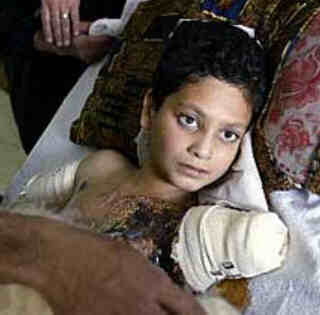 On
a 16 April:
On
a 16 April:2003 Shortly after he arrives at a Kuwait hospital, Ali Ismail Abbas, 12 [12 April photo, in a Baghdad hospital >], is operated upon to graft temporary skin on the burns covering some 35% of his body, which he suffered as he sheets caught fire on or about 30 March 2003, just after midnight, when a US missile hit his Zafaraniya (50 km from Baghdad) home, also causing him to lose both arms (they were shattered by the explosion and later amputated in the local hospital), his father Ismail, his 5-months-pregnant mother Azhar, his younger brother Abbas, and 7 other relatives. His six sisters, aged 6 to 20, and a stepbrother, 10, survive, several of them wounded. While Ali receives all this publicity, there are hundreds of other injured Kuwaiti children left behind where looted hospitals, deprived of electricity, cannot take adequate care of them.
2001 First Union Corp., the 6th largest US bank, announces that it is buying competitor Wachovia Corp. for $13.4 billion in stock, to make under the Wachovia name the 4th biggest US banking company, with $324 billion in assets, trailing only Citigroup Inc., J.P. Morgan Chase & Co. and Bank of America. Analysts doubt that the two disparate corporate cultures of Wachovia and First Union can merge efficiently.
2000 The International Monetary Fund concluded a protest-marred opening session in Washington with a statement repeating past pledges to seek greater debt relief for the poorest countries and reform the IMF so it could better prevent financial crises.
| 1998 Pentagon
computers found vulnerable to hackers.
^top^ The Pentagon announces that a team of ethical hackers discovered security flaws in Defense Department computers. After two weeks of hacking, the security team accessed a US electric power grid that would let the hackers shut down power across the country. The previous February, the Pentagon's unclassified computers had been hit with an organized hack attack targeting personnel records. The Pentagon said it planned to spend about $1 billion a year for several years to improve its computer security. |
| 1998
Apple outpaces profit expectations
^top^ Apple bounced back from two years of losses: Quarterly reports, released on 16 April 1998, showed that Apple exceeded analysts' profit expectations for the second straight quarter. For the first time in two years, Macintosh shipments began to increase. Apple's recovery would continue with the introduction of the popular iMac the following May. |